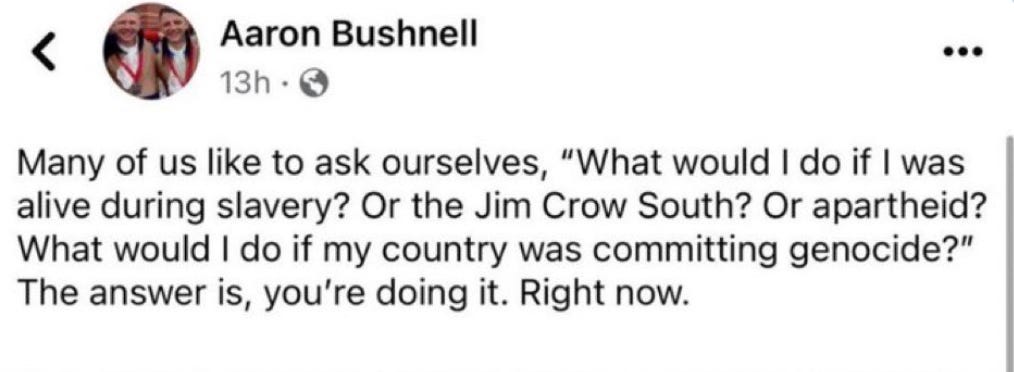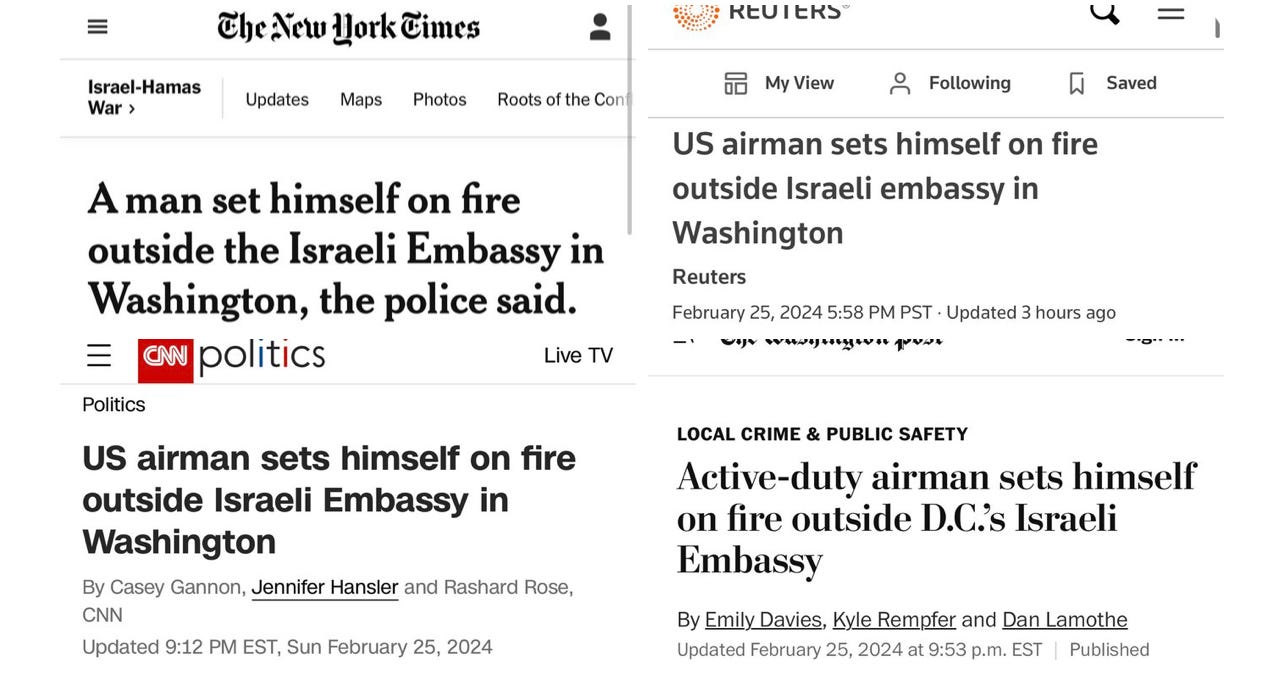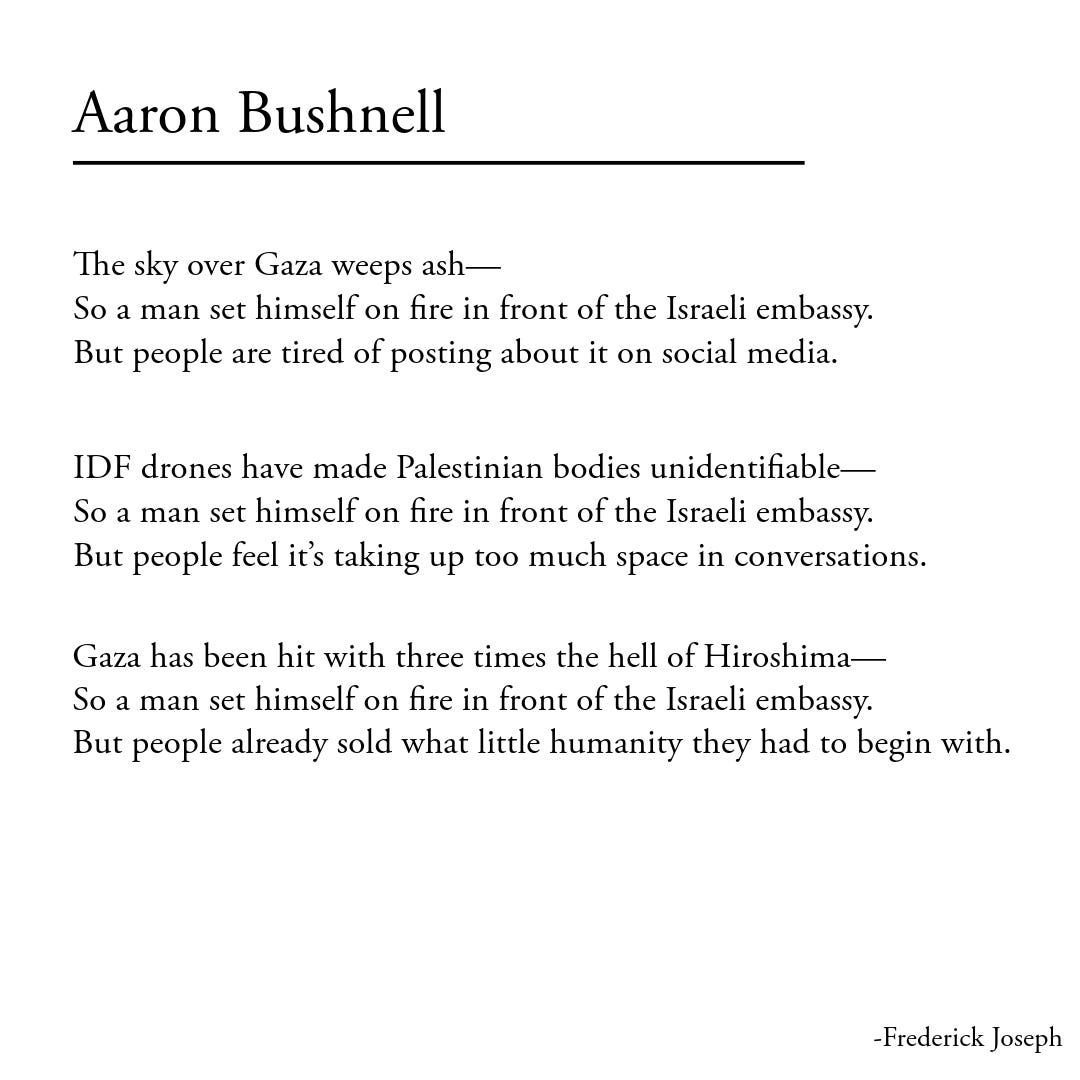The Unyielding Flame of Aaron Bushnell
On the depths of sacrifice in the quest for Gaza's justice.
In the tumultuous tide of progress, where the island of liberation is both a promise and a mirage, there stand individuals, communities, bound not by choice but by circumstance, to the fringes of hope and the edges of despair. These souls, politically disenfranchised, emotionally battered, economically forsaken, and morally tested, find themselves in a relentless storm, not of their making but certainly of their inheritance.
What becomes of these weary travelers on the road to a future uncertain? Well, sometimes, they shake the world.
The story of Aaron Bushnell emerges as a narrative so blunt, so searing, it forces us to confront the very essence of our humanity—or at least what’s left of it.
In an act of profound desperation and startling bravery, this young man from San Antonio, Texas, chose to set himself ablaze (self-immolation) in protest against the Palestinian genocide. This act took place just inches from the gates of the Israeli embassy in Washington D.C., a testament not merely to the depth of his despair but to the breadth of his conviction to hold Israel’s government accountable.
Some may find themselves mortified by the idea of self-immolation, and I can say plainly, it is not a decision I could make for myself. But, when the cries for a ceasefire echo unanswered in the insidious halls of both right and left-wing political power, the act of self-immolation emerges, not as a murmur, but as a thunderous declaration of existence.
The origins of self-immolation can be traced back to ancient times, but it is perhaps most famously encapsulated in the image of Thích Quảng Đức, a Buddhist monk who, in 1963, immolated himself on the bustling streets of Saigon. His body, engulfed in flames, became an emblem of the unspoken agonies of the Vietnamese people under the repressive regime of Ngo Dinh Diem. The photograph of his sacrifice, stark against the backdrop of an indifferent world, jolted the global community, forcing upon it the uncomfortable acknowledgment of a suffering it had chosen to ignore.
This act of self-sacrifice is a thread that weaves through the history of human resistance, from the self-immolation of Jan Palach protesting the Soviet invasion of Czechoslovakia in 1969 to the tragic flames of Mohamed Bouazizi that ignited the Arab Spring in 2010. Each act, though separated by time and geography, speaks to a common truth: that there are circumstances under which the human spirit finds the conditions of life intolerable, where the only voice loud enough to pierce the veil of global indifference is that of the body turned pyre.
The history of self-immolation is a mirror reflecting the darkest aspects of our civilization. It confronts us with the ultimate question of what it means to be human in a world that often seems inhumane.
To that point, if we should judge anyone for Aaron Bushnell’s immolation, we should be judging our elected leaders.
Polls show that the majority of Americans support a ceasefire in Gaza, and yet elected officials in the pockets of Israeli government interest, have ignored the people they were elected to serve. Ignored protests, ignored calls, ignored emails, ignored celebrities, ignored prayers, ignored death. So, what avenues remain? What tools does one have left? It is in this extreme disenfranchisement that the act of self-immolation must be understood—not as an act of destruction but as one of profound bravery and sacrifice.
This bravery is the courage to declare, in the most visceral way imaginable, that the status quo cannot stand, that the suffering inflicted upon the innocent must be acknowledged, and that some truths are so urgent, so raw, that they demand the ultimate sacrifice to be heard.
In the case of Aaron Bushnell, and those like him, self-immolation is not a relinquishment of life but a transcendent grasp on the moral fibers of society. The very image of Aaron screams of injustices that are so egregious, so antithetical to the very essence of human dignity, that they render life intolerable under the shadow of complacency. This act, harrowing in its finality, is a refusal to be complicit through silence, a desperate bid to shatter the mirrors of apathy that reflect only the hollow charades of change.
To dismiss such an act as mere misguidance is to misunderstand the language of utter despair and the dialect of last resorts.
Aaron, at the tender age of 25, embodied a courage that many of us will never know. It is a courage born of an unyielding engagement with the world's pain, a refusal to turn away from the suffering that festers in the open wounds of Gaza and beyond. His act, though it may seem to some as unfathomable, speaks to a truth that is not known by enough people. The truth that this world is overwhelmingly broken.
Most of the power structures and leaders of our society are emotionally fractured and morally bankrupt.
To understand the weight of this world’s wrong doings—and I mean truly understand them—is to teeter on the brink of an all-consuming despair. One that leaves few options left other than being engulfed in flames for the slight chance that you may save the lives of countless others.
Aaron's self-immolation, a spectacle of horror and sadness, begs of us not to look away but to peer deeper into the heart of the atrocity that drove him to such extremes. His was a voice crying out in a wilderness of indifference, a plea for us to recognize our shared humanity, to see beyond the veils of politics and power, and to acknowledge the unbearable suffering of Palestinians.
In his conviction, he did not merely challenge the world; he interrogated it, pressing upon its soul with the heaviness of centuries of unrectified wrongs. He posed a question as relevant in the throes of our current climate as it was during the darkest hours of this nation's past. What would you do? What will you do when the fabric of humanity is torn asunder?
He gave the world his answer, which beckons us to recall the abolitionists and civil rights leaders of yesterday, those who stood firmly against the pitfalls of their times. These heroes, through deeds and sacrifices, illuminated the path toward a moral reckoning. Aaron, in his final act, embodied the essence of this radical tradition.
Songs should be sung about Aaron, melodies rich with the sorrow of his sacrifice and the unyielding hope it represents. These songs should not whisper but roar across the United States in every single home, pausing the lives of every single one of us, as our taxes are used to further soak the streets of Gaza in the blood of over 30,000 lives. Its lyrics should speak to the failures of humanity, and the potential to change course.
Yet, in the aftermath of such an act, we are left to grapple with a haunting question: Will it move the needle? History, with its long ledger of atrocities, its catalog of sufferings both silent and proclaimed, offers a somber reply. The tragedies of Gaza, carved into the memory of the world through a relentless stream of images and stories, have yet to yield the change necessary to alter the course of its hardships.
I also wonder about this act creating necessary change because the machinery of our mainstream media has begun its subtle, yet relentless campaign to obscure the radical protest undertaken by Aaron Bushnell, acting as though the motivations behind his act remain shrouded in mystery. This, despite his unequivocal declaration, broadcasted live for any and all to witness, stating, “I will no longer be complicit in genocide," coupled with his forewarning of an impending “extreme act of protest.”
Countless high-profile media outlets are refusing to actually state why Aaron self-immolated.
In another move that is both insidious and telling, these arbiters of public discourse have sought not only to strip his action of its political dimensions but to recast it within the confines of mental illness. They suggest, with a false concern, that his immolation was the unfortunate outcome of a disturbed mind. This insinuation is a grave disservice, a distortion that masks the clarity of vision with which he confronted the atrocities unfolding before him.
Such tactics are emblematic of the mechanisms by which oppressive systems perpetuate themselves, trivializing acts of defiance as mere symptoms of individual ailment rather than acknowledgments of a societal malaise. Aaron, with a lucidity born of witnessing intolerable injustice, chose a path of protest that was as unequivocal as it was tragic.
In this, Aaron's bravery confronts us with a dual truth: the power of a single act to illuminate the darkest corners of our apathy, and the heartbreaking reality that illumination alone is not enough to dispel the shadows. It reminds us that the work of justice is not for the faint of heart. It demands of us not only to witness, but to act—not in the spectacular fashion of Aaron's final protest, but in the countless, often unseen, ways that we can work to find our shared humanity.
The measure of our bravery lies not in our ability to endure suffering in silence, but in our willingness to confront it, to speak against it, and to labor for a society in which such suffering is no longer necessary. Aaron's act, then, is a call to arms—a reminder that the struggle for justice, for peace, for the recognition of how our Palestinian sisters and brothers are being wronged, is ongoing. It is a struggle that requires not necessarily the sacrifice of our lives, but the full commitment of our hearts, minds, resources, and time.
If we can do that, maybe, just maybe, Aaron’s act will not have been in vain.
A Poem for Aaron:
If you haven’t pre-ordered my debut poetry collection, “We Alive, Beloved,” remember pre-orders are deeply important for marginalized authors. Pre-order numbers tell booksellers and the media that a book has the potential of being successful and should be supported.
You can pre-order here: https://www.simonandschuster.com/books/We-Alive-Beloved/Frederick-Joseph/9781955905640








Thank you for this inspiring essay. You help us recognize the full humanity of Bushnell's sacrifice, one that at first glance seems so unfathomable and contrary to life. You guide us to look more deeply within ourselves to see the reverence for life in his sacrifice, and so challenge us to live with greater purpose.
“self-immolation is not a relinquishment of life but a transcendent grasp on the moral fibers of society” This piece made me cry. Beautifully written. A must read for anyone tired of the pathetic, disingenuous reporting on Aaron. Thank you x